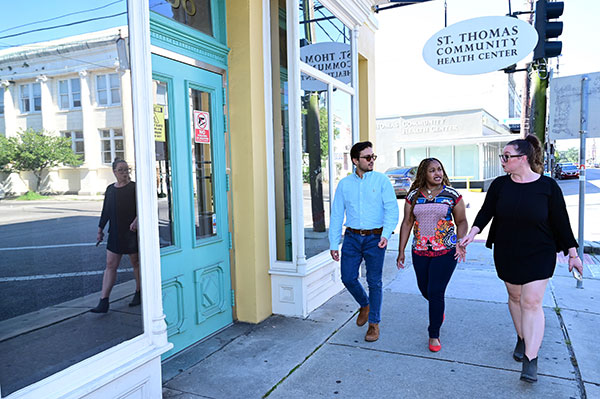
MBA student Juan Ocampo (MBA ’25), left, talks with St. Thomas Community Health Center’s Jochele Gibson, center, and Ivy Robinson (MBA ’23) outside its Magazine Street clinic.
For more than 35 years, St. Thomas Community Health Center has served the medical needs of New Orleans residents regardless of their ability to pay. Originally founded to serve residents of the sprawling St. Thomas Public Housing Development, St. Thomas has evolved into a Federally Qualified Health Center (FQHC) serving more than 21,000 patients at seven clinics and three pharmacies in New Orleans.
While the community’s need for quality affordable health care remains high, St. Thomas’ growth has created some challenges, including how to efficiently manage its inventory of medical supplies across multiple sites.
To gain insights on that process, Ivy Robinson (MBA ’23), St. Thomas Community Health Center’s director of strategic development & operations, reached out to the Freeman School’s Claire Senot, associate professor of management science and an expert in operations management, who connected her with a new course that puts full-time MBA students to work on mission-critical projects for local, regional and national organizations.
The MBA Consulting Practicum connects MBA teams under the guidance of faculty advisors with corporate or nonprofit clients with specific business needs. A centerpiece of the new full-time MBA curriculum, the practicum ensures that every student graduates with a relevant real-world business consulting experience.
At St. Thomas, inventory management had become an ongoing challenge, with multiple staff members devoting significant time to checking supplies and re-ordering essential medical products, such as syringes and bandages. Complicating that process is the short shelf life of some products, which can lead to obsolete inventory.
“We wanted to streamline our inventory management process and centralize the way that we order products from our vendors,” says Robinson. “The project was really about getting some recommendations to work off of to improve that process overall.”
In February 2024, full-time MBA students Jake Davidson, Shreya Jhajharia, Nathan Krippner, Tori Nunnally and Juan Ocampo began meeting with Robinson to learn more about St. Thomas’ needs. Over the next eight weeks, they methodically analyzed St. Thomas’ current inventory management system and worked with Senot to identify inefficiencies and propose solutions.
The students ultimately developed an optimized process flow map for St. Thomas to streamline inventory management and created an inventory- tracking spreadsheet that could be shared across locations to help St. Thomas centralize inventory management and monitor in-stock items in real time.
“The spreadsheet was extremely helpful,” Robinson says. “They created formulas that allow us to determine the appropriate PAR (Periodic Automatic Replacement) level and made it really user friendly for the person using the spreadsheet to determine how many of a particular product is needed based on what’s on hand.”
The students also made recommendations for improving the overall process, such as designating a specific employee to check for and manage expired product and other obsolete inventory and assigning a designee at each site to work with the purchasing manager to maintain adequate PAR levels.
“I was very impressed with the quality of the work product that the students put together for us,” Robinson says of the deliverables. “They really helped us hone in on some of the areas that we can improve, and they put together some very feasible recommendations.”
As the first class to complete the MBA Consulting Practicum, the students were challenged to meet the needs of their client in a compact timeline, but they all agreed it was a great experience.
“It was very enriching,” says Ocampo. “For the entire cohort, being able to work with clients and to connect and grow your network was very fulfilling. Since we were the first ones to do it, there will probably be some minor tweaks and adjustments for the next cohort, but it was a great, great experience.”
“What made the project special for me was that it felt like St. Thomas actually needed our help,” adds Nunnally. “They’re a relatively small organization so they don’t have the resources to spend time on the things that we were looking into. It was evident that they were really going to use the work we did to make changes, so that was very gratifying.”
Senot agrees that the project was an excellent introduction to consulting.
“In any consulting project, you realize that things are missing, and the real world can be a little chaotic,” Senot says. “It’s a good learning experience to see that not everything is clear cut and provided to you. The MBAs had to use critical thinking and apply concepts in a real-world scenario, which can be challenging, but I think they did a great job. They did what the client asked them to do, they helped the community receive better, more efficient health care, and they made a real impact in a very short time frame. I think that’s a win.”

